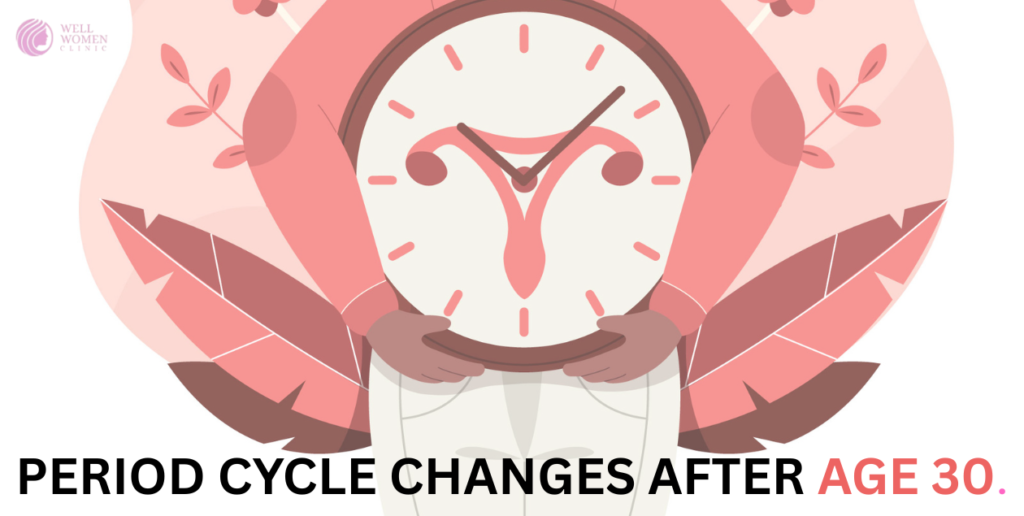This blog explores how menstrual cycles naturally evolve after age 30, highlighting common changes, underlying hormonal shifts, and when to seek medical advice. It offers practical insights into maintaining hormone health and recognizing early signs of perimenopause.
For many women, the 30s are a powerful decade—a time when careers, relationships, and personal goals start aligning. But behind the scenes, the body begins subtle changes, and one area that often surprises women is their period cycle. What used to be clockwork might start to shift—shorter, longer, heavier, or more painful. These changes can be confusing and even worrisome. But in most cases, they’re part of the natural rhythm of a woman’s hormone health evolving over time.
Let’s break down what actually happens to your menstrual cycle after 30, why it happens, and when it’s worth speaking to a professional.
Understanding Hormonal Shifts After 30
From the time menstruation begins in adolescence, the body is governed by a delicate hormonal symphony. Estrogen and progesterone fluctuate in a predictable way, triggering ovulation and menstruation. But by your early 30s, these hormones can begin to subtly change.
Estrogen levels may begin to decline gradually, and ovulation might become less regular—even if you’re not aware of it. These small fluctuations are usually nothing to worry about, but they do affect your monthly cycle. For some women, this translates into slightly shorter cycles. Others may notice more emotional changes, such as mood swings or increased sensitivity during PMS.
Common Period Changes After 30
Here are some of the most typical period changes after 30 that women report:
1. Cycle Length Variations
You might notice your cycle, once a textbook 28 days, now fluctuates between 25 and 35 days. This doesn’t necessarily signal a problem. Hormonal ebb and flow can cause these shifts. However, consistently irregular cycles should be monitored.
2. Heavier or Lighter Bleeding
Your flow might become heavier with more pronounced cramping, or the opposite—it may lighten significantly. Both can be normal, depending on other life factors such as stress, diet, weight, and even sleep quality.
3. More Intense PMS Symptoms
With slight hormonal imbalances, you might feel like your PMS has been dialled up a notch. Bloating, breast tenderness, and irritability may increase. These are all linked to progesterone sensitivity and the way your body metabolizes oestrogen.
4. Mid-Cycle Spotting
Some women experience spotting between periods as ovulation becomes more erratic. While this can be part of a natural hormonal shift, spotting can also be linked to other concerns such as fibroids or polyps, so it’s always worth discussing with your healthcare provider.
5. Shorter or Longer Period Duration
Instead of your usual 5-day period, you may now bleed for just 2–3 days or for a full week. This can occur as your ovulatory cycle begins to adjust, especially in your mid to late 30s.
How Lifestyle Plays a Role
Your 30s often come with life’s added pressures—work responsibilities, family, parenting, and stress. These factors can have a real physiological effect on your period.
- Stress impacts the hypothalamus, the part of your brain that regulates hormones.
- Weight changes—whether gain or loss—can affect estrogen production.
- Exercise routines or lack of physical activity also influence your reproductive cycle.
In other words, your environment and habits are deeply connected to your hormone health
Birth Control and Period Changes
Another common factor in your 30s is a shift in contraceptive use. Whether you’ve decided to stop birth control to plan a pregnancy or start it for family planning, these decisions can significantly impact your menstrual rhythm.
After discontinuing hormonal birth control, it may take a few months for your cycle to return to its natural state. Some women find their periods are irregular or heavier than before. Others experience less cramping and a lighter flow. It varies from person to person.
When Should You Be Concerned?
While most period changes after 30 are natural, some signs should never be ignored:
- Bleeding between periods that’s consistent or heavy
- Severe pain that interferes with daily life
- Sudden changes in cycle length over consecutive months
- Skipping periods (without pregnancy or perimenopause as a reason)
- Blood clots larger than a quarter
If you notice any of these, it’s essential to check for underlying issues such as fibroids, endometriosis, thyroid imbalances, or early signs of menopause.
Is It Perimenopause?
Perimenopause is the transitional stage before menopause—the point when your period stops altogether. For many women, subtle signs begin as early as their late 30s. Irregular periods, night sweats, and mood changes could signal the start of this stage, even though menopause typically happens between 45 and 55.
One important thing to note: perimenopause doesn’t mean fertility is gone, but it does mean things are changing. Tracking your symptoms can help you understand if you’re entering this phase or simply navigating temporary hormonal shifts.
Supporting Your Hormone Health in Your 30s
You don’t need to simply “put up” with the symptoms. There are several ways to support balanced hormones and ease period discomfort:
- Eat a hormone-friendly diet rich in whole foods, fibre, and healthy fats
- Manage stress through mindfulness, therapy, or gentle exercise
- Get enough sleep—quality rest is underrated in hormone regulation
- Stay active with moderate workouts like walking, Pilates, or yoga
- Track your cycle using apps or journals to notice any recurring patterns
These lifestyle changes can provide long-term support for your reproductive and overall health.
Your 30s bring more than just life experience—they also bring shifts in your body that deserve your attention and care. While changes to your period cycle might feel unfamiliar or even alarming, many of them are completely normal. Understanding what’s typical—and what’s not—can help you take control of your health journey with confidence. Whether it’s adjusting your lifestyle or seeking guidance for unusual symptoms, staying informed is the best way to stay in tune with your body.
If you’re seeking a knowledgeable private gynaecologist in London, Well Women Clinic offers personalized care for menstrual concerns, hormonal health, and early menopause. Their expert team is here to support you with clarity, compassion, and tailored solutions.





